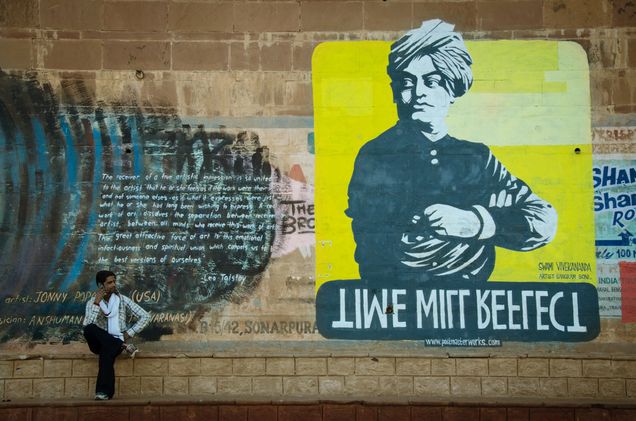The Power of a Text Message: Combating Criminality in Indian Politics Through Voter Information

Most people are shocked to learn that 34 percent of Indian Members of Parliament (MPs) face criminal charges.
These are not trifling charges like unlawful assembly; rather, the majority of MPs with a criminal record—some two-thirds of the 44 percent, or nearly 30 percent of all MPs—face charges for serious crimes such as murder, kidnapping, rape, extortion and dacoity, a word unique to Indian English that means “banditry.” Moreover, researchers have estimated significant negative consequences of having a criminal govern a locality: slower economic growth, lower consumption for the poor, higher crime. The total costs of electing a criminal politician are estimated at about two to three percent of GDP.
The extent of the problem is public knowledge, because a Supreme Court ruling requires candidates to disclose their charges, which are then disseminated by a (relatively) free press. Criminal politicians risk disqualification if they do not declare their charges, but parties and candidates seem confident that voters will not judge—and may even reward—them for their misdeeds.
A peculiar combination of functional and dysfunctional institutions is required to explain this bizarre state of affairs in which violent criminals are elected in free and fair elections. What is the underlying cause of this political equilibrium? Political scientists point to forces that affect the supply of politicians, highlighting criminal candidates’ comparative advantage in mobilizing voters and dark money during election time. Illicit activities and muscle power may give criminal politicians access to funding sources and (to put it euphemistically) “campaign strategies” that other candidates lack.
Moreover, if the state often fails to deliver public services, citizens may value a criminal politician’s vast patronage network and ability to intimidate or grease the wheels of a stalled bureaucracy. These are important, deep reasons, and it is hard to think of a single policy that can change this equilibrium, but one possibly powerful intervention would be increasing voter information and awareness of the criminally charged candidates.
Message sent…
In a new working paper co-authored with Sarika Gupta of the World Bank and Yusuf Neggers of the University of Michigan’s Ford School of Public Policy, we tested a different demand-side explanation for why criminals get elected, namely that voters simply lack information about their candidates.
To test this theory, we ran a voter information campaign experiment in partnership with two of India’s largest telecom companies. Voters in randomly selected treatment villages received a voice call and SMS containing information about the criminal charges (or lack thereof) against all major party candidates in their constituency.
The campaign involved approximately 600,000 voters in 2,000 villages across 50 constituencies. We compared the voting behavior in treatment villages against control villages that did not receive a call or SMS. Treatment villages were compared against control villages in the same constituency that featured the same candidates on the ballot, allowing us to isolate the effect of information on electoral support for criminal politicians.
…Message received
The information campaign increased support for candidates without criminal charges and reduced support for criminally charged candidates. On average, candidates without charges received 2.4 percentage points more votes in treated villages than in control villages, while criminally charged candidates received three percentage points fewer votes, though this effect was not always statistically significant.
The harshest electoral penalties were borne by candidates with more charges and charges for violent crimes. Candidates with murder charges received almost 12 percentage points fewer votes in treatment villages.
Our experiment design did not allow us to identify the exact reason why our information intervention had such a large impact, despite the intervention being relatively light. But there are clues: turnout was essentially unchanged, suggesting that voters may have switched their votes from criminally charged candidates to candidates without charges.
Moreover, the campaign was, if anything, slightly more impactful when the messages included an additional sentence indicating that many other voters had also received the message. This suggests that public information about candidates enables voters to coordinate on “good” candidates.
There may also be other benefits of political information. When voters lack information to screen candidates based on quality, they may rely instead on noisy signals of policy preferences, like ethnicity, religion or other markers of group identity. Political information reduces voters’ reliance on these markers.
The power of a text
Our findings suggest that, even for seemingly intractable problems like criminality in politics, small wins are not as far away as they seem. We estimate that our inexpensive campaign, which cost roughly $13 per village, reduced the likelihood that violent criminals won elections and probably made a difference to the final outcomes of several tight races.
The results also highlight the cost-effectiveness of mobile phone-based information interventions. Mobile phone ownership has skyrocketed in most developing countries over the past decade, and delivering information via mobile phones—about agricultural practices, prices, weather forecasts, news—may be a relatively simple way of empowering people to improve their economic lives.
These improvements may not be immediately transformative, but small wins can snowball into larger gains over time.
Read the Working Paper